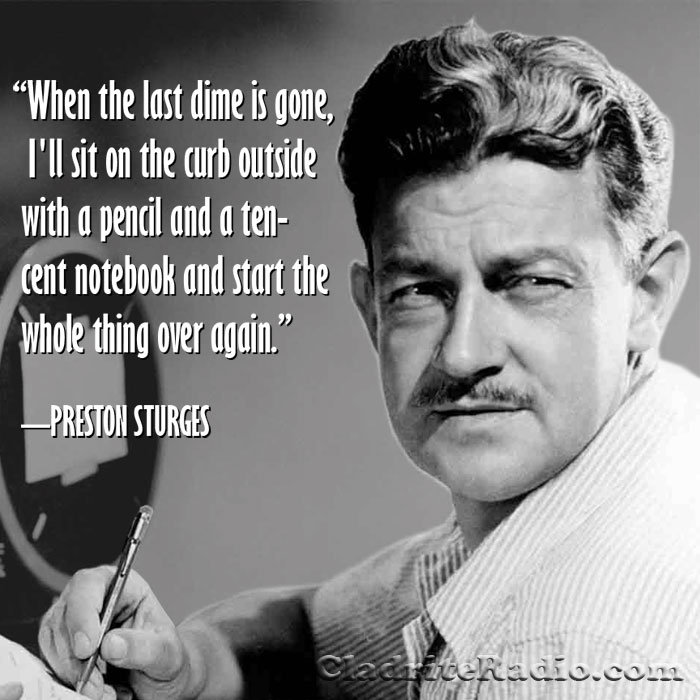Here are 10 things you should know about Preston Sturges, born 124 years ago today. We consider him one of the true giants of American cinema and rank several of his pictures among our very favorites.
Tag: Isadora Duncan
Happy 118th Birthday, Preston Sturges!
The great Preston Sturges was born Edmund Preston Biden 118 years ago today in Chicago, Illinois. We consider him one of the true giants of American comedy filmmaking. Among the pictures he wrote or directed are The Good Fairy, Easy Living, Remember the Night, The Great McGinty, Miracle of Morgan’s Creek, Hail the Conquering Hero, Sullivan’s Travels, The Lady Eve, and The Palm Beach Story—classics, every last one of them. Here are 10 PS Did-You-Knows:
- His mother, Mary Estelle Dempsey (though she would be known by many names), an eccentric character worthy of inclusion in one of Sturges’ films, was close friends with dancer and choreographer Isadora Duncan; in fact, it was a scarf Dempsey gave to Duncan that led to the dancer’s infamous death.
- Sturges’ mother was married several times, but it was her third husband, a wealthy Chicago stockbroker named Solomon Sturges, who was a true father to Preston. He adopted him when Sturges was 4 years old and provided guidance and support to him throughout his life.
- Prior to launching his writing career, Sturges was employed as a runner on Wall Street and worked for his mother’s cosmetics company, even inventing a kiss-proof lipstick.
- In 1917, Sturges enlisted in the Army Air Service, serving at Camp Dick in Texas without ever seeing action. Three Hundred Words of Humor, a humorous essay he wrote for the camp newspaper, was his first published work.
- Sturges claimed to have introduced the club sandwich to Germany.
- His first success came on Broadway with a play he wrote called Strictly Dishonorable. He wrote the play in just six days, it ran for 16 months (a very lengthy run in 1929), and he was working for Paramount Pictures soon thereafter.
- He worked for a decade as a studio screenwriter, and though he wrote some terrific movies during that time, he was often frustated by the final product.
- So eager was Sturges to direct his own scripts that he sold the rights to The Great McGinty to Paramount for just one dollar (some reports say the fee was $10), with the stipulation that he would be allowed to direct it. He would go on to win the very first Academy Award for Best Original Screenplay for that script.
- Sturges amassed a troupe of actors that he used repeatedly in his films, and when the studio objected, fearing the actors’ faces would become too familiar to the audience, Sturges responded, “These little players who had contributed so much to my first hits had a moral right to work in my subsequent pictures.”
- In the 1940s and ’50s, he owned and operated a nightclub called The Players on the Sunset Strip.
Happy birthday, Preston Sturges, wherever you may be, and thanks for the laughs!

Happy Birthday, Elsa Lanchester!
Elsa Lanchester, who was born 113 years ago today, enjoyed a long and varied career in show business, but she’s so strongly associated with her role in The Bride of Frankenstein (1935) that we wonder if she ever got tired of being asked about it.
We suspect she did.
Born in London to “bohemian” parents, she studied dance as a child with Isadora Duncan (we wonder if she encountered young Preston Sturges, whose mother was bosom buddies with Duncan during those years) and eventually began to work in cabaret and the theatre.
Her unconventional marriage with Charles Laughton began in 1929 and lasted until his death in 1962; the pair were to appear in 12 movies and a great many theatrical productions together.
Though most people immediately think of her role as the Bride when the name Elsa Lanchester is mentioned, she enjoyed an impressive and lengthy motion career, appearing in The Private Life of Henry VIII (1933), David Copperfield (1935), The Spiral Staircase (1945), The Razor’s Edge (1946), The Bishop’s Wife (1947), The Big Clock (1948), Mary Poppins (1964), and Murder By Death (1976); she even appeared in an Elvis Presley picture: Easy Come, Easy Go (1967). Lanchester was nominated twice for the Academy Award for Best Supporting Actress for Come to the Stable (1949) and Witness for the Prosecution (1957).
Lanchester also worked frequently on television, appearing as a guest star on programs such as I Love Lucy, The Alfred Hitchcock Hour and The Man from U.N.C.L.E.
Elsa Lanchester died at age 84 in Woodland Hills, California, on the day after Christmas, 1986.
Happy birthday, Ms. Lanchester, wherever you may be!
Times Square Tintypes: Arthur Hopkins
SH—SH—SH!!


